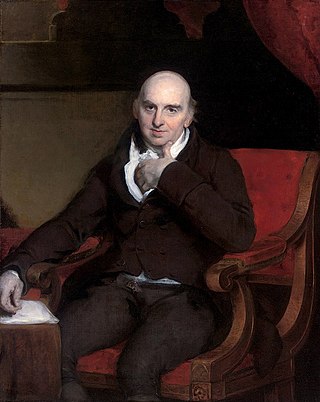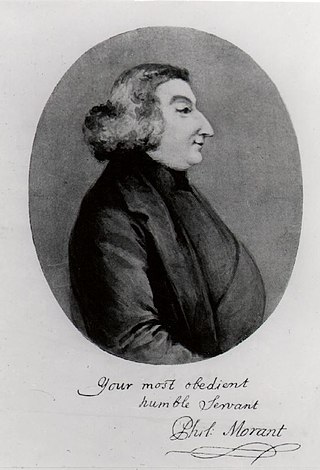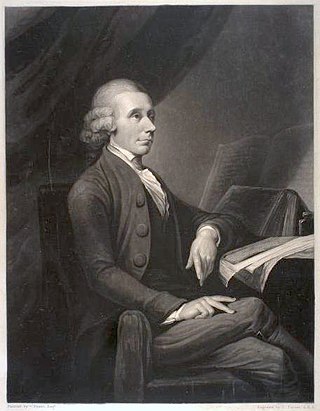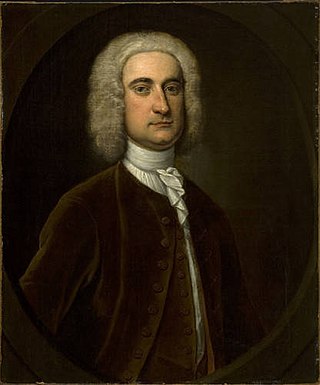
William Morgan, FRS was a British physician, physicist and statistician, who is considered the father of modern actuarial science. He is also credited with being the first to record the "invisible light" produced when a current is passed through a partly evacuated glass tube: "the first x-ray tube".

Philip Morant was an English clergyman, author and historian.

The Theological Repository was a periodical founded and edited from 1769 to 1771 by the eighteenth-century British polymath Joseph Priestley. Although ostensibly committed to the open and rational inquiry of theological questions, the journal became a mouthpiece for Dissenting, particularly Unitarian and Arian, doctrines.
James Merrick (1720–1769) was an English poet and scholar; M.A. Trinity College, Oxford, 1742: fellow, 1745: ordained, but lived in college. It is said that "[h]e entered into holy orders, but never could engage in parochial duty, from being subject to excessive pains in his head". He published poems, including The Chameleon; translated from the Greek and advocated the compilation and amalgamation of indexes to the principal Greek authors; versified the Psalms, several editions of which were set to music. His work was featured in Oxford religious poetry anthologies.
John Upton was an English clergyman, academic and critic. An important early editor of Edmund Spenser, he is best known for the notes in his 1758 edition of Spenser's great romance epic The Faerie Queene, which was first published in 1590 and 1596.
John Mottley (1692–1750) was an English writer, known as a dramatist, biographer, and compiler of jokes.
Annals of Philosophy; or, Magazine of Chemistry, Mineralology, Mechanics, Natural History, Agriculture and the Arts was a learned journal founded in 1813 by the Scottish chemist Thomas Thomson. It shortly became a leader in its field of commercial scientific periodicals. Contributors included John George Children, Edward Daniel Clarke, Philip Crampton, Alexander Crichton, James Cumming, John Herapath, William George Horner, Thomas Dick Lauder, John Miers, Matthew Paul Moyle, Robert Porrett, James Thomson, and Charles Wheatstone.

Erasmus Middleton (1739–1805) was an English clergyman, author and editor.
Thomas Salmon (1679–1767) was an English historical and geographical writer.
Murray's Family Library was a series of non-fiction works published from 1829 to 1834, by John Murray, in 51 volumes. The series editor was John Gibson Lockhart, who also wrote the first book, a biography of Napoleon. The books were priced at five shillings; Murray's approach, which did not involve part-publication, is considered a fundamentally more conservative business model, and intention, than used by the contemporary library of the Society for the Diffusion of Useful Knowledge.
Joseph William Moss M.D. (1803–1862) was an English physician. He is known for his Manual of Classical Bibliography (1825).

John Loveday (1711–1789) was an English antiquarian. With the publication of his journals, he is now known for descriptions of English country houses.
Nathaniel Morren (1798–1847) was a Scottish minister and author, known as a historian of the General Assembly of the Church of Scotland.
George Ogle was an English author, known as a translator.

Sylvanus Morgan was an English arms-painter and author.
Joseph Windham (1739–1810) was an English antiquarian.
Morgan Hen ab Owain or Morgan the Old, first known as Morgan ab Owain of Gwent and also known as Moragn Hen Fawr, was the king of Morgannwg. He ruled from AD 942 to 974.
Thomas Newlin (1688–1743) was an English cleric, known as a preacher.

Giles Munby (1813–1876) was an English botanist. His major work concerned plants in North Africa, where he lived for 15 years.
George Motherby M.D. was an English physician and medical writer. He is noted for the early definition of the medical term placebo in the 1785 edition of his medical dictionary.
![]() This article incorporates text from a publication now in the public domain : Lee, Sidney, ed. (1894). "Morgan, J.". Dictionary of National Biography . Vol. 39. London: Smith, Elder & Co.
This article incorporates text from a publication now in the public domain : Lee, Sidney, ed. (1894). "Morgan, J.". Dictionary of National Biography . Vol. 39. London: Smith, Elder & Co.





